
Discussing goals is a common speaking topic in adult ESL classes. Ask most students in an intensive English course what their number one goal is, and you’ll probably hear, “Learn English” or “Graduate university.” What’s missing and what they have often not really thought about are the short-term goals that will help them build up to what will likely take much longer to accomplish. They’ve got their eyes on an outcome goal, but without any plans for how to achieve it, they often flounder and never fully achieve it.
That’s why goal setting is a popular and relevant theme for adult ESL classes.
What do they need to do to create smaller, more attainable goals that will lead to success, and how can you help?
#1. Find out what they’re doing NOW.
Ask them. What steps are they taking NOW to put them on that path to success? They might say that they’re taking English classes. Bravo! However, we all know that just taking classes doesn’t ensure success. So what does?
#2. Discuss process goals.
What are process goals? They are those specific actions that you take that lead you to attaining your outcome goal (that big end goal that represents the big win). No one has much control over an outcome goal. It’s far off in the distance, and there are many outside influences (loss of employment, a family member who needs care, a global pandemic) that can derail everything, especially if you are just blindly skipping down that yellow brick road towards the rainbow.

These are the goals your students have more control over. They can decide how much time they will devote to studying each day, when they will study, where, and what. The more specific they are, the more they think about it, the more likely they are to do it. Without envisioning it down to specific details, it just becomes something vague that is easily skipped.
When? Not just the evening…get a time frame. From 7 to 9 pm. Where? Not just at home. In the living room at a desk/table that is/will be set up. What? Not just English. Vocabulary. Academic vocabulary. Vocabulary related to their future field of study/occupation. Discussing goals, in general, is a start. Nailing down the process gets them further.
#3. Talk about the obstacles.
Discussing goals without talking about the obstacles is a big Pollyanna. Something is going to happen to make the best thought out process goals get set to the side.
Having a plan in place for how to overcome known obstacles will make them so much easier to deal with when they arise and provide a few tools to work with when those unknowns pop up.
What will they do when they feel motivation lagging? What about when they suddenly have less time to study? How can they help prevent distractions? Making plans to deal with what could crop up can help them see what has held them back in the past and develop a new way of dealing with it. The old ways likely didn’t work, or they probably would’ve already achieved their goal.

#4. Discuss performance goals.
So they’re going to study engineering vocabulary at their dining room table on Mondays, Wednesdays, and Fridays from 7 to 8 pm. By what standard will they judge how well they’ve accomplished this performance goal? How often will they check their process? What will they do if they don’t meet their performance goal? What new goal will they set once they do, and how will they celebrate achieving each goal along the way? Celebrations are important. They give us something to look forward to and be excited about, and they increase motivation if/when that starts to falter.
#5. Set up accountability
You’ve probably heard of mastermind groups in the business world. Adult students can use these as well. The pandemic has taught us that we really don’t NEED to be in person for everything. If your students can’t find a classmate or someone locally who has similar goals and drive, they can try reaching out on the internet. When they share their process goals and then regularly report on their progress, they’ll have someone on hand to bounce ideas off of when the going gets tough, as well as someone to celebrate with when they unlock another level of their study goals.
#6. Teach flexibility.
Planning what to do when obstacles arise is important. Being flexible decreases the likelihood of giving up when achieving the outcome goal seems impossible. If they are regularly missing their process goals, they should take another look and see what might need to be adjusted. Perhaps they need to change their approach, but they might have to temporarily or permanently adjust the process goals themselves. They should dream big but also be realistic.

Is all that really necessary for discussing goals?
We often ask our students about their goals, congratulate them on their big dreams, and leave it right there. In a way, we might be dooming them. When we just share our goals, we’re not making ourselves accountable. We’re not actualizing what we want to achieve. We’re just making a wish. If you want to help your students achieve their goals, get them talking about the processes, the obstacles, and the game plans for overcoming those obstacles. Don’t believe me? Watch Keep Your Goals to Yourself with your students. This short TED talk tells why.
Looking for Goal Setting resources to use with your adult ESL students?

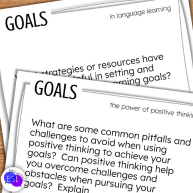
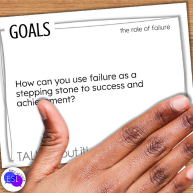
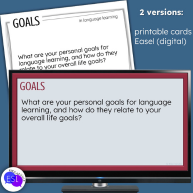

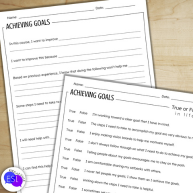

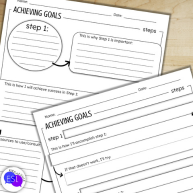
Read more about teaching adult ESL!
- BOOM! Incredible Digital Resources for Adult ESL
- Two Priceless Adult ESL Teaching Tips to Always Remember
- Getting into the Nitty Gritty of Practical English for Adult ESL
FREEBIE ALERT!
Subscribe to my newsletter and get a FREE set of posters to share with your students.
Need something for a writing class? Try using reflective writing!

Cynthia Frey says
I have an hour of conversational practice with internationals. They are wonderful and I enjoy working with them. Thank you for your help.
Rike Neville says
You’re welcome! Conversation classes can be so much fun, especially the more you get to know your students. 🙂